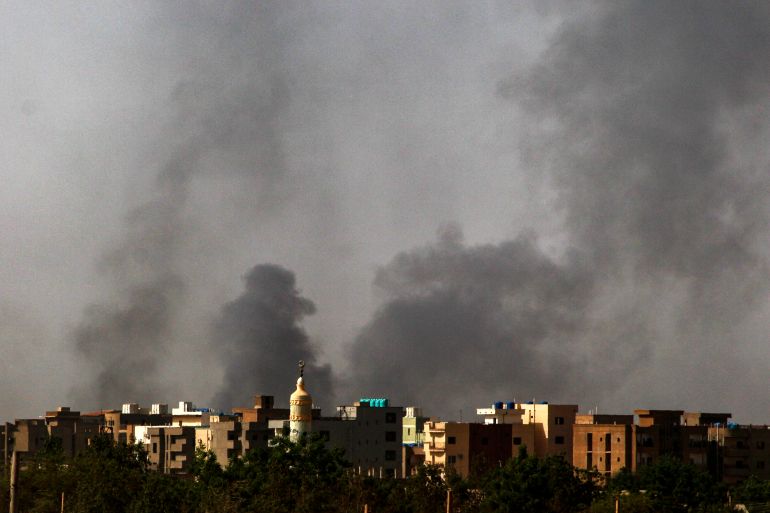Sudan army brings in reinforcements as it battles RSF in Khartoum
Fighting has intensified in Khartoum as well as Darfur, despite US sanctions that were imposed due to the collapse of ceasefire talks.

The Sudanese army has called in reinforcements to aid in its fight with its rival, the paramilitary Rapid Support Forces (RSF), sparking fear among residents in the capital of Khartoum that the conflict will intensify.
Residents in the southern part of the capital reported seeing the reinforcement troops, alongside a heightened military presence of the RSF, Al Jazeera’s Hiba Morgan said on Saturday from Omdurman, a city adjoining Khartoum.
Keep reading
list of 4 items‘They don’t know I’ve left’: Families split apart as Darfur burns
US imposes first sanctions over Sudan conflict
Sudan latest: US sanctions, suspended talks, continued fighting
The Sudanese army has been trying to take control of a military base there that belongs to the RSF for the past two days. Residents have been warned to stay as far away as possible from the base, Morgan said.
Fighting has also continued to rage elsewhere in the state of Khartoum as well as Darfur, intensifying despite United States sanctions imposed after the collapse of a US and Saudi-brokered ceasefire late on Thursday.
“Fighter jets are flying overhead in the city of Omdurman. And there’s been air strikes launched by the army on RSF positions in the northern parts of the capital,” Morgan said.
“There have also been sounds of artillery reported in the centre of the capital.”
Journalist Matt Nashed, speaking from neighbouring Egypt, said the army seems to be attempting to launch a much larger offensive in the capital.
“They want to try to recapture some territory it does not control … in Khartoum and the point for this really, is to save face and build some leverage before entering negotiations with the Rapid Support Forces,” he said.
“The second reason would be related to trying to maintain its minimal symbolic support that it still has from constituents within Khartoum,” Nashed added.
A day earlier, shelling rocked greater Khartoum with witnesses reporting “artillery fire” in the eastern part of the state and around the state television building in Omdurman.
On Wednesday, the country experienced the most deadly single attack since the conflict began with at least 18 people killed and a further 106 wounded, Morgan reported, adding that artillery shelling hit a market in Khartoum resulting in civilian deaths.
The persistent fighting, spanning more than seven weeks since the conflict between the duelling generals of the army and the RSF broke out on April 15, has forced volunteers to bury 180 bodies recovered from combat zones without identification, the Sudanese Red Crescent said on Friday.
The ceasefire talks were meant to allow humanitarian actors to operate safely. But the Red Crescent volunteers have found it difficult to move through the streets to pick up the dead due to security constraints.
Additionally, aid groups face other troubles, with the World Food Programme (WFP) reporting this week that nearly 17,000 tons (15,400 tonnes) of food aid have been looted since the start of the conflict.
“The aid that was looted in El Obeid was destined for more than four million people in the western region of Darfur,” Morgan said, referring to one of the WFP’s largest logistics bases in Africa located in North Kordofan state.
“Some of those who we spoke to say that they’re concerned not of being hit by an artillery or an air strike, but that because of the humanitarian situation, they may die of hunger,” she added, referring to the humanitarian crisis.
More than 1,800 people have been killed, according to the Armed Conflict Location and Event Data Project, and at least 1.6 million displaced within the country or across its borders, the United Nations has said, with many fleeing to Egypt, Chad and South Sudan.